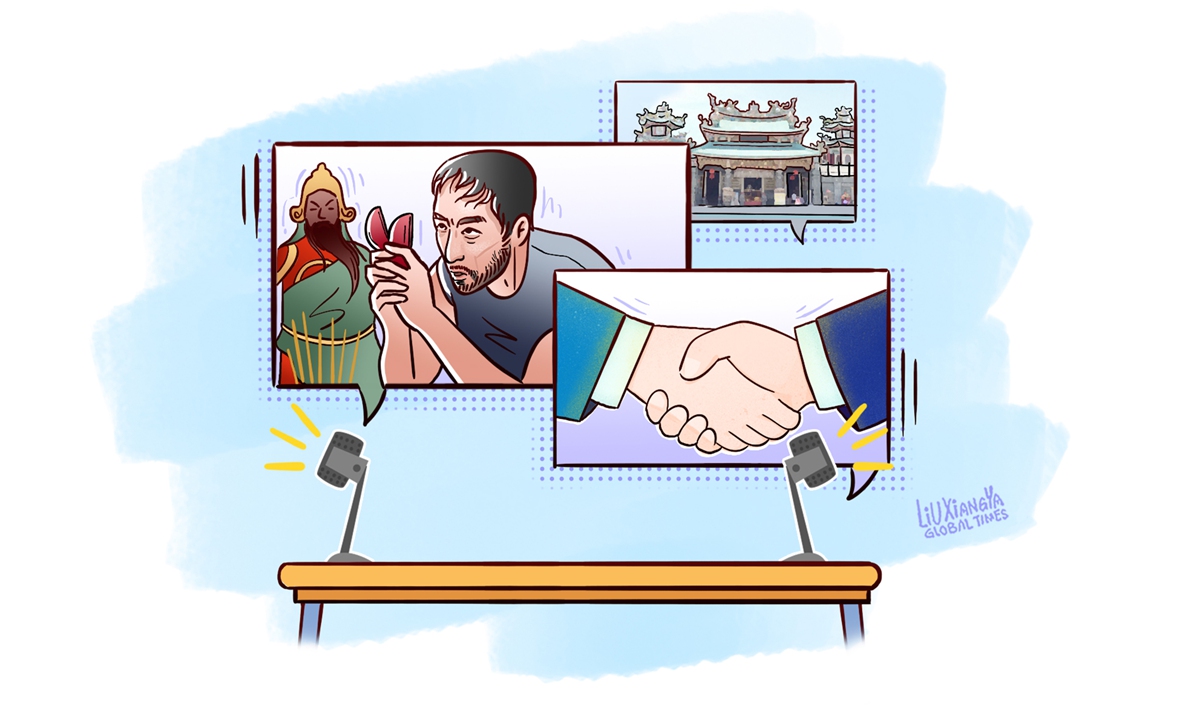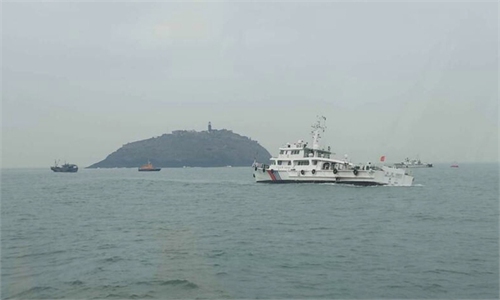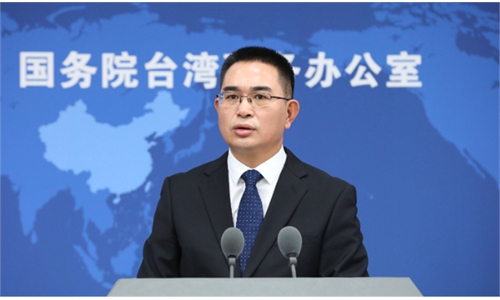ARTS / CULTURE & LEISURE
Cross-Straits affinity unchanged amid strong cultural resilience

Illustration: Liu Xiangya/GT
To deepen cross-Straits understanding, especially that among the young, contact and cultural exchanges have the potential to make a difference, which will lead them to see that people across the Straits are all the same family and share the same roots, experts from both sides of the Taiwan Straits said during an exchange event on Monday.
The Pig, the Snake and the Pigeon, a crime thriller from Taiwan, starring Ethan Juan, was first released in Taiwan in October. Since its release in the mainland on March 1, the film has been very well received by audiences there.
During a regular press conference held by the Taiwan Affairs Office of the State Council earlier in March, a reporter from Taiwan asked what the spokesperson thought of Taiwan movies becoming popular in the mainland. Chen Binhua, spokesperson for the Office, said that people across the Straits are all the same family and share the same language, and it's especially easy for them to empathize with each other.
In the film, there was a scene in which the protagonist throws jiaobei, a divination tool, on the ground to ask the gods a question. It is a traditional Chinese divination method to tell whether a future course of action the diviner is considering is recommended or not. The pieces, called poe in Fujianese dialect or jiaobei in Putonghua (Standard Chinese), bear a resemblance to the two shells of a clam. Throwing jiaobei can be observed at Taoist and other Chinese temples, such as Guandi temples and Mazu temples, and is common in the Chinese mainland and Taiwan.
"Many of my friends came to me to discuss the details of throwing jiaobei in the film, the similarities and differences between the practices between the mainland and Taiwan," Yang Du, a writer from Taiwan, made the remarks at the 12th iteration of the "Cross-Straits Scholars Face-to-Face" series of academic activities in Beijing with the theme "Exchanges of cross-Straits folk religion, customs and cultural identity."
Co-hosted by the Academy of Chinese Culture in Beijing and Xiamen University in Fujian, the series, which takes a different theme for each iteration, aims to enhance in-depth dialogue between scholars from the Chinese mainland and Taiwan.
It is very fascinating that a scene from a film can start a conversation on cross-Straits folk religion and customs. Conversations like this gradually help both sides to realize the same cultural identity and the same, deep roots they have always shared. Yang pointed out that politics doesn't change local folk religions and customs in Taiwan. Such a deep bond of shared history and culture between the people across the Straits of course will transcend the passage of time.
"The bond reflects the consistency and the uniformity of Chinese civilization," said Chen Jinguo, a professor of religion studies at Minzu University of China in Beijing, who joined Yang at the panel discussion. The five prominent features of Chinese civilization are consistency, originality, uniformity, inclusivity, and a peaceful nature. Beyond the shared cross-Straits folk religion and customs, it is a history and culture with the same roots, shared values, beliefs and pursuits, he added.
Chen pointed out that to deepen cross-Straits understanding, especially among the young, we don't need to achieve the goal through any kind of grand narrative. Instead, concrete communication and cultural exchange events have a better chance and greater potential to make a difference.
Yang shared Chen's view, noting that many young people in Taiwan like to watch short videos from the Chinese mainland on social media and they like the popular culture in the mainland. It provides them a window to learn more about the mainland, correcting the bias and false image of the mainland fabricated by Western media.
The Taiwan Affairs Office disclosed on Monday that Ma Ying-jeou, former chairman of the Chinese Kuomintang party, will lead a delegation of young people from Taiwan to visit the mainland from April 1 to 11. The delegation will visit Guangdong and Shaanxi provinces as well as Beijing to attend a ceremony honoring the Chinese nation's legendary ancestor Huangdi, or the Yellow Emperor, as well as other events.
The spokesperson for the Taiwan Affairs Office extended a warm welcome, voicing the hope that compatriots across the Taiwan Straits can jointly carry on fine traditional Chinese culture, promote exchanges and cooperation in various sectors between the two sides including young people, advance the peaceful development of cross-Straits relations, and jointly promote national rejuvenation. Such concrete cultural exchanges are a great example of making a difference in terms of deepening the understanding between young people on both sides of the Straits.
It is clear that shared heritage and values are the cornerstone of the cross-Straits relationship. By continuing to promote cultural exchanges and understanding, especially among the younger generations, we are laying the foundation for the peaceful development of these relations. The path to a shared future lies in the simple acts of exchange and communication that bring us closer to realizing that we, indeed, have always been part of the same family.


